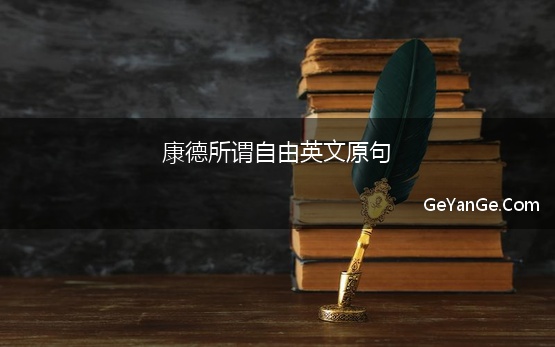康德所谓自由英文原句 30句康德说过的英语名言

学习力为您带了了30句康德说过的英语名言,请参考。
1、一个人没有信心,第二天都不想起床。
A person have no confidence, all don't want to wake up the next day。
2、天才是自创法则的人。
The principles of genius is created。
3、贪是人类内心对外界无止境的欲望。
Greed is the human heart endless desire to the outside world。
4、发怒,是用别人的错误来惩罚自己。
Angry, is using someone else's mistake to punish oneself。
5、美是道德的象征。
Beauty is the symbol of morality。
6、要评判美,就要有一个有修养的心灵。
To judge the United States, there must be a has the tutelage of the mind。
7、一个人的缺点来自他的时代,他的美德和伟大却属于自己。
One's weakness from his age, his virtue and great was their own。
8、哲学无法教授,哲学永远是思想者的事业。
Cannot, a professor of philosophy is always a thinker's career。
9、自由不是想干什么就干什么,而是想不干什么就不干什么。
Freedom is not want to do, but don't think don't do anything。
10、三样东西有助于缓解生命的辛劳:希望,睡眠和微笑。
Three things help to ease the pains in life: hope, sleep and smile。
11、能充实心灵的东西,乃是闪烁着星星的苍穹,以及我内心的道德律。
Can enrich the mind, but the twinkling stars in the firmament, and the moral law inside of me。
12、一个人说出来的话必须是真的,但是他没有必要把他知道的都说出来。
A man say it must be true, but he didn't need to say he knows。
13、大海之所以伟大,除了它美丽、壮阔、坦荡外,还有一种自我净化的功能。
The sea is great, besides its beautiful, magnificent, magnanimous, there is a self purification function。
14、位我上者,灿烂星空;道德律令,在我心中。
My superiors, bright stars; Moral imperative, in my heart。
15、自由不是让你想做什么就做什么,自由是教你不想做什么,就可以不做什么。
Freedom is not letting you do whatever I like, what is free to teach you don't want to do, you can not do。
16、诚实比一切智谋更好,而且它是智谋的基本条件。
Honesty is better than all the ingenuity, and it is the basic condition of ingenuity。
17、一个行为的道德性不取决于它的结果,而仅仅取决于该行为背后的意图。
The morality of an act does not depend on its results, but only depends on the intent behind the action。
18、有两样东西,对它们的盯凝愈深沉,在我心里唤起的敬畏与赞叹就愈强烈,这就是:头顶上的星空和心中的道德律。
Look for them there are two things that the more deep, in my heart arouse awe and admiration of the more strong, that is: the starry heavens above and the moral law。
19、我们越是忙越能强烈地感到我们是活着,越能意识到我们生命的存在。
The more busy the more can we felt strongly that we are alive, can realize the existence of our lives。
20、越是处心积虑地想得到生活上的舒适和幸福,那么这个人就越是得不到真正的满足。
The more deliberately want comfort and happiness in life, so this man the more I can not get real satisfaction。
21、既然我已经踏上这条道路,那么,任何东西都不应妨碍我沿着这条路走下去。
Now that I have set foot on the road, so, nothing should prevent me to go along this road。
22、一杯水是清澈的,而海水却是黑色的。就像小的道理可以说明,真正的大道理却是沉默的。
A glass of water is clear, and the water of the sea is dark。 Like a small reason can explain, the real truth is silent。
23、世界上只有两样东西是值得我们深深景仰的,一个是我们头上的灿烂星空,另一个是我们内心的崇高道德法则。
Only two things in the world is worth deeply admire, a bright star is our head, another is our lofty moral law within。
24、有两件事物越思考就越觉得震撼与敬畏,那便是我头上的星空和我心中的道德准则。
There are two things, the more think more feel shock and awe, that is my head of the stars and the moral standard in my heart。
25、道德确实不是指导人们如何使自己幸福的教条,而是指导人们如何配享有幸福的学说。
Morality does not guide people how to make the doctrines of his own happiness, but how to guide people to be worthy of happiness。
26、理性一手拿着自己的原理,一手拿来着根据那个原理研究出来和实验,奔赴自然。
The principle of rationality in one hand his hand brought forth according to the principle of the study and experiment, to the nature。
27、良心是一种根据道德准则来判断自己的本能,它不只是一种能力;它是一种本能。
Good conscience is a kind of according to the code of ethics to determine their own instincts, it's not just a kind of ability; It is a kind of instinct。
28、我们所有的知识都开始于感性,然后进入到知性,最后以理性告终。没有比理性更高的东西了。
We all started in the perceptual knowledge, and then into the intellectual, finally ended in rationality。 Nothing is higher than rational。
29、那最神圣恒久而又日新月异的,那最使我们感到惊奇和震撼的两件东西,是天上的星空和我们心中的道德律。
The most sacred permanent and with each passing day, the most surprise us and shake the two things, is in the sky the stars and the moral law of our heart。
30、老年时像青年时一样高高兴兴吧!青年,好比百灵鸟,有他的晨歌;老年,好比夜莺,应该有他的夜曲。
Old age like youth happily! Youth is like the lark, had his morning song; Old age is like the nightingale, there should be his nocturnes。. 世界粮食日由来
1979年11月,第20届联合国粮农组织大会决议确定,1981年10月16日(联合国粮农组织创建纪念日)是首届世界粮食日,此后每年的这一天都作为“世界粮食日”,其宗旨在于唤起全世界对发展粮食和农业生产的高度重视。
康德的简介
伊曼努尔·康德(1724年4月22日—1804年2月12日)德国哲学家、天文学家、星云说的创立者之一、德国古典哲学的创始人,是唯心主义、不可知论者,德国古典美学的奠定者。
康德出生在德国东部一个名叫哥尼斯堡的小镇,与同时期周游世界各地的其他学者不同,康德一生几乎没有离开过家乡,也终生未娶、孤独终老。
康德把德国人逻辑上的严谨性、思辨上的周密性发挥到了极致。他的著作极其的晦涩难懂,他习惯把一个简单陈述用特别严谨、周密的方式表达出来,虽然这种表达方式十分客观公允、没有歧义,但对于读者而言确实是一个不太愉悦的阅读体验,这也就是为什么他的第一部巨著《纯粹理性批判》出版时无人问津的原因。
康德所处的时代正是西方近代科学和人文精神飞速发展的时代,也是深陷危机的时代。他的理论以批判哲学著称,用《纯粹理性批判》阐释清楚了自然科学的定律,用《实践理性批判》论证分析了人文道德的准则。
康德修桥赶路的故事
1779年,德国哲学家康德计划到一个名叫珀芬的小镇,拜访朋友威廉。彼特斯。动身前,他写信给彼特斯,将于3月2日上午11时到达。
康德是3月1日到达珀芬的,第二天早上,他租了一辆马车。
朋友住在离小镇18公里远的一个农场,小镇和农场隔了一条河。马车来到河边,车夫说:“先生,不能再往前走了,因为桥坏了。”
康德下了马车,看了看桥,发现中间己经经断裂。河虽然不宽,但是,水很深,而且结了冰。
“附近还有别的桥吗?”他焦虑地问。
“有,先生。”车夫说,“在上游9公里的地方,还有一座桥。”
康德看了一下怀表,巳经是上午10时。
“如果走那座桥,我们什么时候可以到达农场?”
“估计要到12时30分。”
“如果我们经过面前的这座桥,最快能在什么时间到?”
“不到40分钟。”
康德跑到河边的一座农舍,向主人打听,“请问,你的那间破屋要多少钱才肯出售?”
“为什么?”农夫一惊。”
“您愿意不愿意?”
“给200法郎吧。”
康德付了钱,说“如果您马上从破屋拆下几根长的木条,在20分钟内把桥修好,我将把破屋还给您。”
农夫把两个儿子叫来,按时完成了任务。
马车快速地过了桥,在乡间公路上飞奔,10时50分,赶到了农场。
在门口迎候的彼德特斯高兴地说:“亲爱的朋友,您真守时。”


